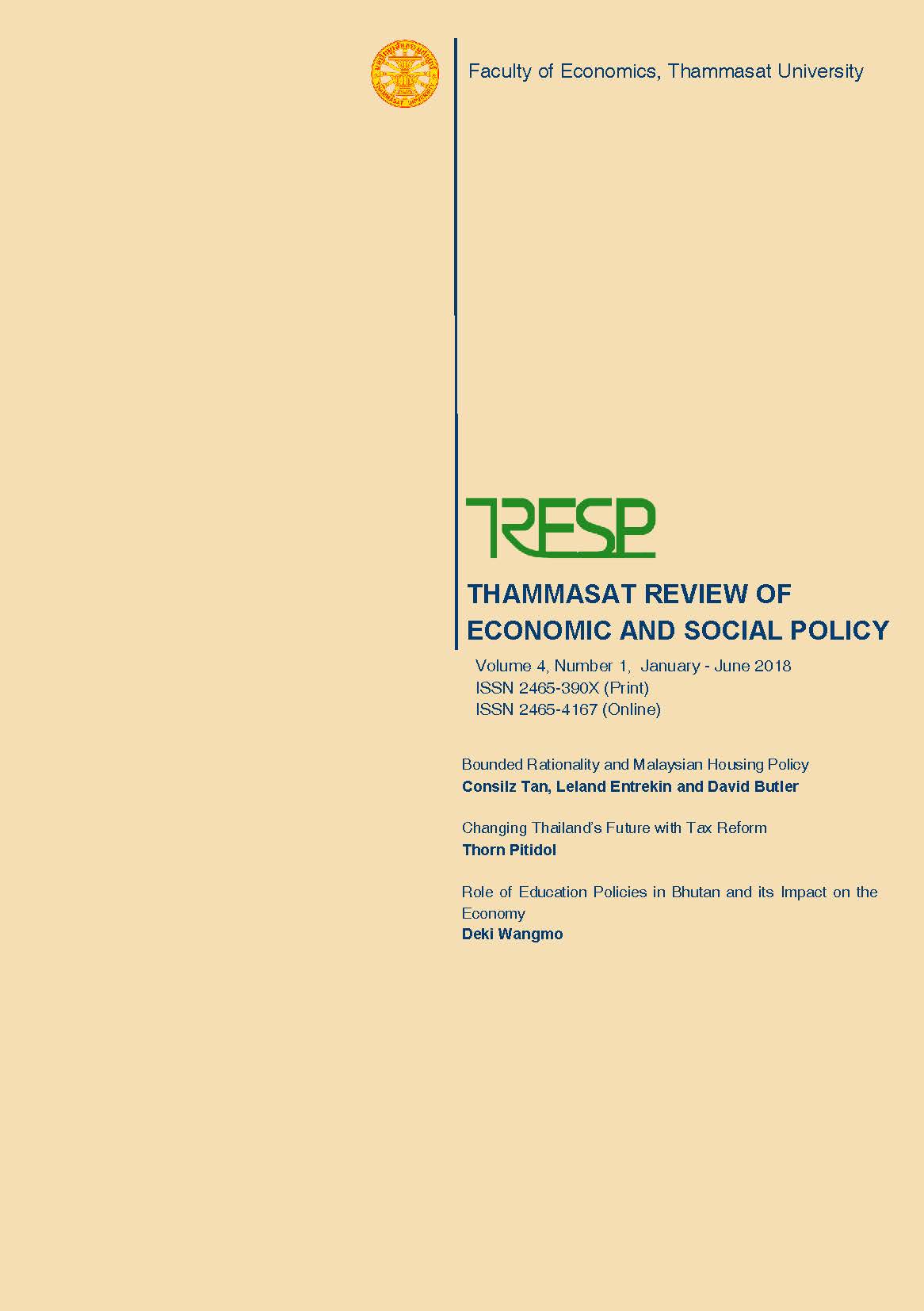Role of Education Policies in Bhutan and its Impact on the Economy
DOI:
https://doi.org/10.14456/tresp.2018.3Keywords:
Education policies, Education in Bhutan, Human capital development, Economic developmentAbstract
Education has had a tremendous impact on economic development both in general and in helping to transform the lives of individuals. There is no doubt that education is a core element of any sector development. However, education is also criticized for creating unemployment and increasing rural-urban migration which created more pressure on employment. Therefore, to have a successful economic transformation, education policies and curriculum should be adopted to match the changing needs of society. This paper portrays the role of education policies in Bhutan and its impact on the economy in stylized facts.
References
Andersson, A. (1985). Creativity and regional development, Papers in Regional Science, 56(1), 5-20.
Bray, M. (2002). The costs and financing of education: Trends and policy implications. Manila: Asian Development Bank.
Benhabib, J., & Spiegel, M. M. (1994). The role of human capital in economic development evidence from aggregate cross-country data. Journal of Monetary economics, 34(2), 143-173.
Cypher, J. M., & Dietz, J. L. (2008). The process of economic development. Routledge
Department of Education, Bhutan (2002). Education Sector Strategy: Realizing Vision 2020 Policy and Strategy
Florida, R., Mellander, C., & Stolarick, K. (2008). Inside the black box of regional development—human capital, the creative class and tolerance. Journal of economic geography, 8(5), 615-649.
Healy, T., & Côté, S. (2001). The Well-Being of Nations: The Role of Human and Social Capital. Education and Skills. Organization for Economic Cooperation and Development, 2 rue Andre Pascal, F-75775 Paris Cedex 16, France.
Hanushek, E. A., & Woessmann, L. (2011). How much do educational outcomes matter in OECD countries? Economic Policy, 26(67), 427-491.
Harvey, L. (2000). New realities: The relationship between higher education and employment. Tertiary Education & Management, 6(1), 3-17.
Jamtsho, S., & Bullen, M. (2007). Distance education in Bhutan: Improving access and quality through ICT use. Distance education, 28(2), 149-161.
Jacobs, J. (1969). Strategies for helping cities. The American Economic Review, 652-656.
Lucas, R. E. (1988). On the mechanics of economic development. Journal of monetary economics, 22(1), 3- 42.
Ministry of Finance, Bhutan (2015). National budget financial year.
Ministry of Labor and Human Resource, Bhutan (2014). Unemployed Youth Perception Survey report.
National Statistics Bureau, Bhutan (2015). Bhutan at a glance.
Phan, D. and Coxhead, I. (2013). Princelings and Paupers? State Employment and the Distribution of Human Capital Investments Among Vietnamese Households. Available at SSRN: http://dx.doi.org/10.2139/ssrn.2265481
Policy and Planning Division, Bhutan (2015). Annual education statistics.
Power, C. N. (2000). Graduate Department of Education, University of Queensland. School governance: Research on educational and management issues, 1(3), 152.
Psacharopoulos, G. (1985). Returns to education: a further international update and implications. Journal of human resources, 583-604.
Psacharopoulos, G. (1994). Returns to investment in education: A global update. World development, 22(9), 1325-1343.
Romer, P. M. (1990). Human capital and growth: theory and evidence. In Carnegie-Rochester Conference Series on Public Policy (Vol. 32, pp. 251-286). North-Holland.
Solow, R. M. (1956). A contribution to the theory of economic growth. The quarterly journal of economics, 65-94.
Sanyal, B. C. (1987). Higher Education and Employment: An International Comparative Analysis. The Falmer Press, Taylor & Francis Inc., 242 Cherry St., Philadelphia, PA 19106-1906.
Wangchuk, N. (2015). Principals’ Perspectives on Autonomous Schools in Bhutan (Doctoral dissertation).



